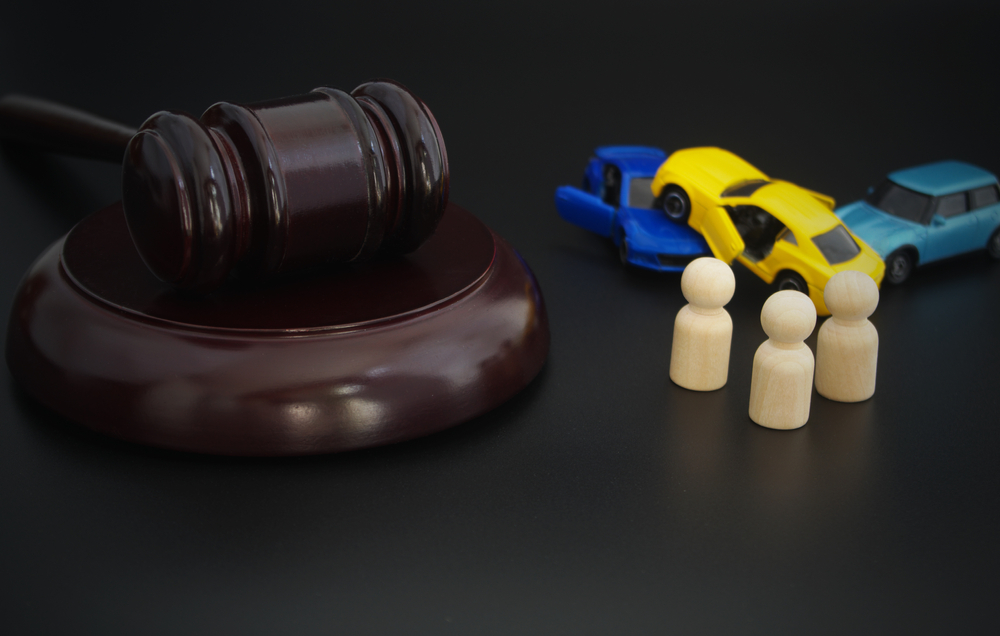All across the nation, no matter what state you live in, car accidents are unfortunately frequent, ranging from minor fender benders to life-altering collisions. After a serious car accident, you're likely facing physical injuries, emotional trauma, financial burdens, and navigating the complexities of insurance claims.
When you hire a seasoned car accident lawyer, they understand the profound impact a car accident can have on your life. That's why they are committed to fighting for your rights and securing the compensation you deserve.
After a car accident, you have the legal right to pursue compensation for your damages from the at-fault driver or, more often, their auto insurance company.
The amount you should ask for or settle for will depend on your damages, the details of the accident, and the actions of the other driver who caused your damages and injuries.
The best way to know if you're settling for a fair amount is by consulting with a skilled Sebastian car accident lawyer in your area.
Schedule A Consultation Today!
Common Car Accident Injuries
Car accident injuries can range from minor scrapes, cuts, and bruises to severe spinal cord damage, head injuries, and even fatal injuries.
The most common ones include:

- Head and facial injuries: Concussions, traumatic brain injuries (TBI), severe lacerations, foreign bodies in the eye, and broken facial bones
- Neck and back injuries: Whiplash, broken vertebrae, slipped discs, spinal cord injuries (SCI), and strains
- Arm and leg injuries: Broken bones, strains, sprains, amputations, severe lacerations, and dislocations
- Internal injuries: Severe bleeding, organ damage, broken pelvis, and broken ribs
- Catastrophic injuries: Life-altering injuries such as a severe TBI, an amputation, or an SCI resulting in paralysis
- Burns: Fires are not uncommon in car accidents, putting victims at risk of severe burns anywhere on their bodies.
The severity of your injuries will impact what your claim is worth and, therefore, how much you should ask for in a car accident settlement. More severe injuries that require higher levels of medical and more time off of work should garner larger settlements.
Understanding Car Accident Damages
The value of your car accident case is usually determined by a complex set of factors, with your damages playing a central role. Damages refer to the losses you have incurred as a result of the accident, and they fall into two main categories: economic (or special) and non-economic (or general) damages.
Economic Damages: Tangible Losses
Economic damages represent the tangible financial losses you have experienced due to the accident. You substantiate these expenses with receipts, bills, and other documentation.
Common examples of economic damages include:
- Medical expenses: Including all costs associated with medical treatment, including hospital stays, doctor's visits, prescription medications, physical therapy, and any necessary medical equipment.
- Lost Income: If you have been out of work or otherwise did not earn all your income due to your injuries, you are entitled to compensation for the money you lost. This includes past and future lost income, as your injuries may have long-term implications for your earning capacity.
- Travel expenses: Any travel costs incurred to attend medical appointments or obtain necessary medical care are considered economic damages.
- Out-of-pocket expenses: This includes expenses directly related to your injuries, such as over-the-counter medications, medical equipment like crutches or a wheelchair, or alternative transportation if your car was damaged or totaled.
Non-Economic Damages: Intangible Losses
Non-economic damages represent the intangible losses you suffer due to the car accident. These damages are often harder to quantify since they don't typically have associated financial receipts or bills.
Common examples of non-economic damages include:
- Pain and suffering: The physical and emotional pain you must endure as a result of your injuries, including the physical discomfort, emotional distress, and psychological trauma caused by the accident.
- Mental anguish: The emotional and psychological distress you have experienced as a result of the accident, such as anxiety, depression, post-traumatic stress disorder (PTSD), and any other mental health issues resulting from the trauma.
- Scarring and disfigurement: If you have sustained visible scars or disfigurement from the accident, you may be entitled to compensation for the impact these physical impairments have on your life.
- Loss of enjoyment of life: Includes the diminished ability to engage in activities you once enjoyed due to your injuries. It may involve limitations in hobbies, recreational pursuits, social interactions, or personal relationships.
- Loss of consortium: This refers to the loss of spousal companionship or intimacy due to your injuries. It can manifest as a disruption in marital relations, emotional support, or household duties.
Determining the Value of Non-Economic Damages

Due to their inherent subjective nature, non-economic damages are harder to calculate than economic damages. Insurance adjusters, attorneys, and juries often use a multiplier to determine the value of non-economic damages.
This multiplier applies to the value of economic damages, with a higher multiplier reflecting more severe injuries and a more significant impact on your life. There are also other ways to determine their value.
When you hire an experienced car accident lawyer, they can show how much your non-economic damages should be worth and what you should ask for in your car accident settlement.
Factors that Can Affect the Value of Your Car Accident Claim
Unfortunately, some factors can decrease your claim's value, no matter how much you deserve for your damages.
When you hire a skilled car accident attorney, they can mitigate these factors so you receive as much as possible for your damages. Factors that might be detrimental to your claim include:
Pre-Existing Health Conditions or Injuries
If you had pre-existing health conditions or injuries before the car accident, it's common for the insurance company to argue that your pre-existing conditions contributed to your current injuries.
This may cause a reduction in the compensation you stand to receive, as the insurance company may only be willing to pay for the portion of your injuries that they believe are directly attributable to the accident. However, with legal representation, you can still maximize your compensation.
Providing a Recorded Statement to the Other Party's Insurance Adjuster
Insurance adjusters know how to gather information to reduce or deny your injury claim. Therefore, you must be cautious when interacting with the other party's insurance adjuster.
Any statements you make, especially recorded statements, can work against you in your claim if adjusters twist your words or take them out of context. You should always speak with an attorney before giving any recorded statements to the insurance adjuster.
Lack of Credible Witnesses to Bolster Your Claim
Eyewitness testimony can support your car accident claim and maximize the settlement the insurance company offers you. It will strengthen your claim if you have witnesses who can corroborate your account of the accident and your injuries.
However, if you lack credible witnesses, the insurance company may question the validity of your claim. Even if you don't have witnesses, your attorney can use other pieces of evidence to help support your claim.
The Strength of Other Evidence in Your Claim
In addition to eyewitness testimony, other forms of evidence can also impact the value of your car accident claim. This includes medical records, police reports, and property damage estimates. The more comprehensive and compelling the evidence you have, the stronger your claim will be.
Lack of Insurance Coverage for the At-Fault Party
If the at-fault party doesn't have sufficient insurance coverage, you may not recover the total compensation you deserve. Sometimes, you may need to pursue a civil lawsuit against the at-fault party to recover damages. Your attorney can help with that.
The Parties at Fault for the Accident
The identity of the parties at fault for the accident can also affect the value of your claim. For instance, if the at-fault party is a government entity, the law may limit the compensation you can recover.
Additionally, if the at-fault party is a commercial vehicle driver, their insurance company may be more likely to fight your claim.
Mitigating the Negative Affect on Your Claim
While these factors can negatively impact the value of your car accident claim, there are steps you can take to mitigate their impact.
Hire a car accident attorney. An attorney can collect evidence, negotiate with insurance companies, and present a strong case in your favor. They can also advise you on how to avoid making mistakes that can jeopardize your claim.
Remember, the value of your car accident claim depends on various factors, and seeking legal counsel is crucial to ensure you receive the maximum compensation you deserve.
How a Car Accident Lawyer Can Get You the Settlement You Deserve

No matter what type of injuries you suffer in a car accident, you can receive full compensation for your damages. It's an unfortunate mistake to assume that the liable party's insurance company will simply provide you with a fair settlement.
It's natural to hope for the best, but insurance companies are only out for themselves. They are in business to make money. They won't make as much money if they give money away by paying every claimant fairly.
However, by hiring a skilled attorney, you will have an advocate who can get you the settlement you deserve for your injuries. Here's how they can accomplish this goal:
Providing Representation
The fact that you have legal representation tells the auto insurance company that you are serious about getting what you rightfully deserve. It sends a clear message that you aren't just going to accept the first offer they provide you.
Having a lawyer on your side automatically increases your claim's value in the eyes of the insurance company. They know they can't use their typical tricks and tactics for claimants with legal representation.
Understanding the Value of Your Claim
A car accident attorney has a unique perspective on the value of your claim. Valuing personal injury claims is a large part of their job, and they have vast experience in this area.
If you aren't well-versed in insurance claims and personal injuries, you may settle your claim for much less than it's worth. With their knowledge, you can ensure that you settle for nothing less than what you deserve.
Using Evidence in Your Favor
Attorneys know what evidence is necessary to prove the value of your claim. They know how to find and collect this evidence and use it to your advantage. Injured parties often cannot obtain significant evidence independently because they don't know how important it is or where to get it.
They do not know how to demand evidence preservation or subpoena documents that other parties refuse to provide voluntarily. A lawyer can handle all of this.
Negotiation Skills
Car accident lawyers are also skilled negotiators. Not only do they know what you should receive for your claim, but they know the strengths of your case and the weaknesses of the at-fault party's case and can use them both to their advantage. They can also work to minimize any weaknesses in your case.
Litigation Experience
A car accident attorney is ready to litigate your claim if all else fails. In a small number of claims, litigation is necessary to get an injured party the compensation they are entitled to receive. While your attorney will do all they can to negotiate a fair settlement, sometimes litigation becomes necessary.

Seeking a Car Accident Attorney for Maximum Compensation
Remember, you are not alone in this journey. Navigating the complexities of a car accident claim can be daunting, especially while dealing with the physical and emotional aftermath.
A Sebastian personal injury lawyer can provide the guidance and support you need to maximize your compensation. Your attorney will thoroughly assess your case, collect valuable evidence, negotiate with auto insurance companies, and advocate for your best interests throughout the car accident claims process.
Seek your free case evaluation by a reliable attorney today to begin the process. Waiting can result in a weaker case or even losing your right to compensation.
